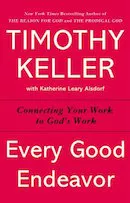Reading the Bible with Workplace Eyes - An Interview with Will Messenger Part 2
Blog / Produced by The High Calling
Will Messenger is an Episcopal Priest in Boston with an MBA in marketing from Harvard Business School, D.Min. from Gordon-Conwell Seminary, and M.Div. from Boston University School of Theology. He is the former Director of the Mockler Center for Business and Ethics at Gordon-Conwell and is now the interim writing director for the Theology of Work Project. After speaking at Laity Lodge last year, Will sat down with us to talk more about what the Bible says about the meaning and value of work, whether you're in sales, financial analysis, energy, or medical diagnostics.
Why is the institution of the church seemingly unable to address questions of meaning that people have in the daily activity of their work?
It's not a simple answer because there are multiple causes or roots of the situation we're in. One is the tradition. The Christian church inherited this idea, primarily from the Greek world, that economic matters, work, things like that are inferior to intellectual or spiritual matters. It's kind of ingrained in our caricatures of religious life. If you say the word "heaven" to people in the church, what image comes to mind? As a pastor (Messenger was ordained in 1998), I can tell you many think of people in white robes playing harps on clouds. Yet there's absolutely nobody in a white robe playing a harp on a cloud in the Bible!
There are some churches, pastors, theologians, working Christians, and church-related organizations that are addressing the workplace. But the church needs to do more—in particular in understanding theology of work. Most people, if they don't already enjoy their work, have a hidden hope that they would. Often church leaders don't know enough about what people do for a living. You have to know the details of someone's work if you want to help them make a difference in their work. The church is getting good at saying my work matters to God, but now what? How can the church guide me in doing my work well?
What more would you like the church to say?
I'd like my church to help me with the daily situations I face in my work. For instance, when I was at IBM, about mid-way through my time there, we were under increasing competition in the '80s. Someone remembered that IBM's main strength was its highly trained, highly professional sales force. So, we began to position ourselves with customers not as salespeople, but as consultants. Well, a consultant is under the obligation to propose the best solution they can come up with, regardless of whose hardware it is. Does this mean when we go consult with our clients, we're supposed to propose no IBM hardware or software unless we think it would be more effective. The answer of course was NO. Our job was to sell IBM. So, I said, "Okay ,that means we're not consultants, we're salesmen, we're good salesmen, we're professional salesmen, but we're not consultants." I wanted my church to help me think through this and decide what I should do about this. Was my thinking correct? Should I openly oppose IBM's new policy? Should I quietly do what I thought was right with my own customers? I felt the Christian faith had something to say about this, about truth and integrity. We weren't trying to lie to our customers, but I wanted help from the church to figure out the difference between making a good point and kind of spinning unrealistically.
You're basically trying to help others with what you wish would have been somehow provided for you.
That's exactly right. It's what I began to try to do as a pastor and teacher.
I want to hear about that. Did you preach on some of these questions that you have?
All the time, not specifically about IBM, but about how following Jesus could make a difference in daily life, including specific workplace situations. Pastors basically preach to themselves. You take a question you're interested in, and you try to find the answer. If it's something you aren't even interested in, how will your congregation be interested in it? I came to embrace the idea that if preachers do this well, others can benefit from it also. I feel the same way about theology at work.
What did you learn as a pastor serving a church, trying to integrate all of these questions and experiences you brought from the workplace?
It was a lot harder than I expected. I spent my first three years as an assistant pastor at an Episcopal Church in suburban Boston. Just recently, I finished four years as a church planter and founder of Charles River Church in Boston that really intended its prime mission to be equipping people for daily life at work. In both cases, it was difficult. It's not hard to preach a sermon where you bring genuine questions of daily life and work to the text, to try and find answers. But because people in the congregation work in so many places that are so different from each other, there's only so deep you can go.
For example, in my mind, truth and deception in the workplace is becoming a crucial topic. Yet in terms of giving out specific applications, it really depends on a person's workplace. I can tell you that it's never right to put out false or deliberately misleading financial statements. But think of a more typical situation: you're competing long-term with someone else for a promotion, and you know they're making a proposal today that isn't very good. How much should you correct them? Hopefully, you want to do what's best for the company. Hopefully, you don't want to compete with the person in an unjust or unloving way. Anything you say is probably suspect anyway, because you're competing with them down the road. How should you handle the situation? Ethics aren't relative, but the specific context changes. If you're a manager, and you know there's going to be a layoff and someone asks if his/her job is safe (because they want to buy a house), what are you supposed to say? Diverse workplaces work out these ethical principles in a variety of ways. I believe all of them need to apply the Christian faith to finding these answers in their own context.
You're an adjunct professor at Gordon-Conwell Theological Seminary and the leader of the Workplace, Leadership and Business Ethics program. Have you given up on the church as the central place of equipping laity for their daily work?
As an ordained pastor, I love the church. I haven't given up, but I am frustrated with church culture and what I see and experience in most church organizations. In general, church has not connected with people in terms of their work or in most aspects of daily life, with maybe the exception being family. Robert Wuthnow, the Princeton sociologist, calls this the greatest act of self-marginalization the church has ever engaged in. I don't want to say, "Fine, forget the church, we're going to find alternative delivery mechanisms, channels, organizations to deliver our message." I don't just blame this on pastors or lay people. I've been in both of those roles. I know how hard it is. We really need a fundamental change in how churches view their mission. Equipping people for the workplace should be one aspect of that, but it's not the only aspect. Churches have gotten so adapted to just doing what they do, that for the most part, they have lost a sense of what the world needs. I don't have the answer, but I feel like if I get 20 to 25 years in this field, I'll be able to help find the way forward.
Isn't this what you're trying to do as the Research/Writing Director of the Theology of Work Project—trying to create structure that integrates some of these theological workplace questions that you have?
One thing I'm very excited about is we are creating a worldwide high quality community of discourse. We want to engage workplace theologians from around the globe, make use of the best existing publications, test our conclusions with workplace Christians, so that things we develop aren't idiosyncratic, not just my best guess, or your best guess. So we're going to read the whole Bible with workplace eyes by pairing biblical scholars with workplace Christians from around the world. We hope to produce something like a biblical commentary, if that is the right word, a biblical guide so to speak on work. Scripture has profound workplace implications. When Jesus said, "let your yes be yes and your no be no," my guess is he meant that to apply at work also.
We began by polling about 150 highly influential people in our field, (Howard Butt, Jr., David Rogers, Dwight Lacy, and David Williamson of Laity Lodge being among them) and asked, "What are the top ten workplace questions you wish you had some guidance with?" We received more than 600 specific questions that I boiled down to 20 key topics. One of them is on work and rest. Another one is on calling. Yet another is on ethics, very distinctly on Christian business ethics. And so on. We plan to publish our research on these 20 topics online, so that we can invite others to contribute ideas, articles, stories, and feedback, sort of like a wiki. We think these 20 topics are broad enough to be widely applicable, but specific enough to not just be platitudes.
We are also trying to develop a process that people in the workplace can use to discover biblical, theological help for them. Ultimately the work of developing processes by which people can do theology for themselves is most important to me, because of all the questions I've had in the variety of workplaces I've been in.
<< Read Part 1 of our interview with Will Messenger: How Do I Follow Christ in my Work?





